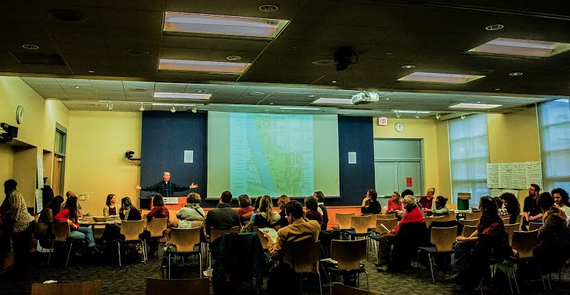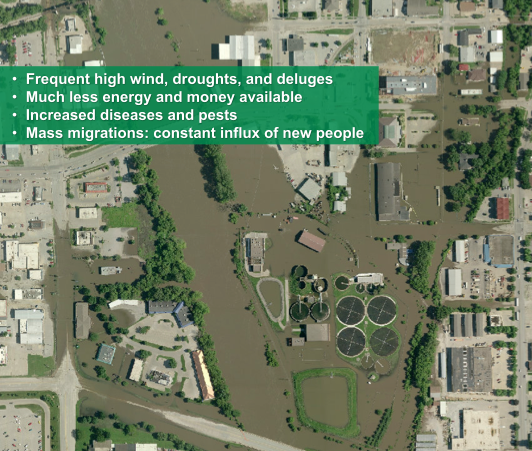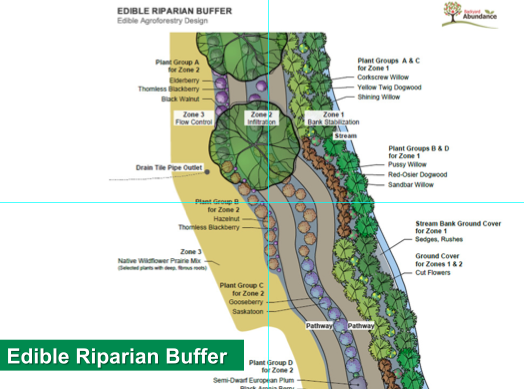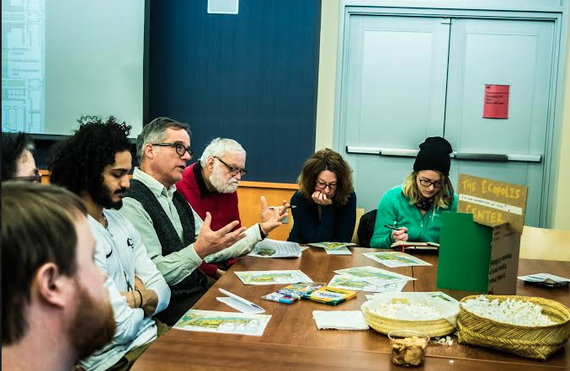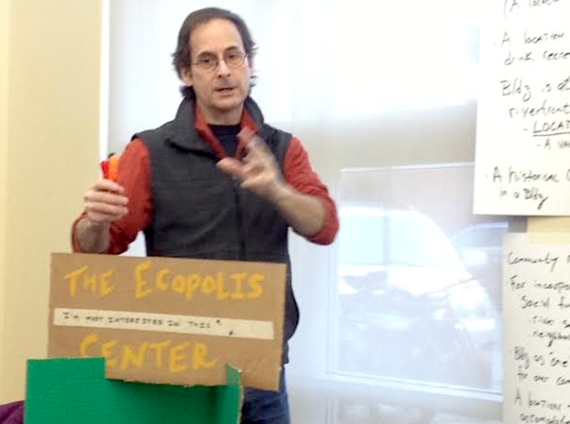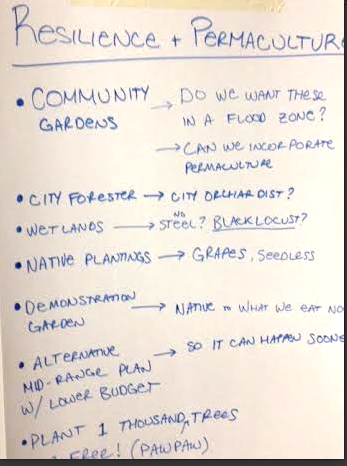(All photos courtesy of Miriam Alarcón Avila)
When the UN Climate Summit kicked off last fall with the short film, "What's Possible," actor Morgan Freeman's challenge to "our leaders to be brave, and their choices to be bold" resonated with Iowa City residents, who filled a record six million sand bags along the Iowa River during the historic 2008 flood.
Nearly seven years later, as the city formalizes plans to rebuild a new Riverfront Crossings Park in a flood-prone area slated for urban renewal, diverse groups of artists, local food entrepreneurs, permaculture advocates and community organizations took part in a forum on Feb. 21 to shape a bold Riverfront Park that reflects the city's commitment to resilience and climate action.
The special event was hosted by the Ecopolis Forum, a growing movement of numerous groups in Iowa City advocating for the city and community to build on current sustainability efforts and work collaboratively on regenerative city initiatives in the areas of local food, renewable energy, and restorative urban designs.
On Monday, Feb. 23, the City Council of Iowa City will be asked to set a public hearing on plans for the demolition of all structures, including the historic PWA-era Control House on the former site of the North Wastewater Treatment Plant, which will make up a large part of the proposed Riverfront Park.
"Everyone agrees that creating a resilient city is common sense," said Fred Meyer, a nationally recognized permaculture expert and director of the Iowa City-based Backyard Abundance. "What we need now is common action. These Ecopolis Forums help galvanize residents, organizations, and city staff to take common sense actions."
Meyer and Jenna Ladd, a former University of Iowa student gardener and environmental coalition leader, presented an overview of recent studies on climate change, including drought, and flooding in the riverfront area, and design possibilities for regeneration and restoration.
City park plans include a wetlands restoration area, among other proposals. However, due to funding restrictions, according to a recent city memo, "it is likely the future park site will sit as vacant grassy land for a number of years."
(Riverfront Crossings District area, Iowa City)
Forum participants broke into four discussion groups: Food, medicine, materials; water, river and creek restoration; resilience and permaculture; and an Ecopolis Center for the arts, environmental education and demonstration area.
Part of this vision for a bold Riverfront Park includes the preservation and renovation of the historic PWA-funded Control House on the edge of the waste treatment plant as a public center for the Park, especially during the several winter months of minimal outdoor use.
"As a culture we discover and build our narratives on the art, artifacts and architecture of previous generations," said Louise Rauh, an Iowa City artist. "Repurposing the PWA-built Control House into a community center where art, ecology and entrepreneurship meet will articulate the path Iowa City intends to take as far as preservation and sustainability and provide a strong visual gateway to the proposed development in this area."
For many residents, the construction of the Control House in 1935 serves as a cautionary tale for the development of today's Riverfront Park: With generous federal funds and financial support from the University of Iowa, the historic Control House building and waste treatment plant emerged from a city outcry over open sewage and its impact on the Iowa River and community health.
"The undeniable urgency to address climate change today presents a similar challenge to our city and riverfront," said Carla Paciotto, an Iowa City resident. "Are we going to ignore the lessons of history--and destroy historic buildings--or are we going to make sure we do all that is possible to preserve historic landmarks and incorporate them into our climate action plans for the future?"
(Iowa City residents at Ecopolis Forum on Riverfront Park)
That future for many forum participants begins with the Iowa River and the Riverfront Park.
"People have their back turned to the very river that gave rise to this city 175 years ago," said Mel Schlachter, with the Iowa River Friends organization. " The University has had its back turned. The City has had its back turned. Most citizens and candidates for city office know it only as a threat, and remember people by the hundreds filling and laying hundreds of thousands of sandbags in 2008."
Schlachter added:
"Yet, you start to tell a story about the river, you pull out a photo of people swimming and boating in it in times past, you talk about the brown trout that used to swim in it and the mussels in it right now struggling for life; you talk about the guy who pulled out a 30 pound catfish by city park or describe a white water rapids that could go through a roller dam; you talk about your own kayak out there, and people start to turn, to turn and have another look at the river. You see the whisp of a thought that maybe it is not beyond reclamation, maybe we can find ways to enjoy it now and work for better later on. Now they are facing it. Maybe our City and University can be part of it again. The Old Capitol does look out at the river, after all."

